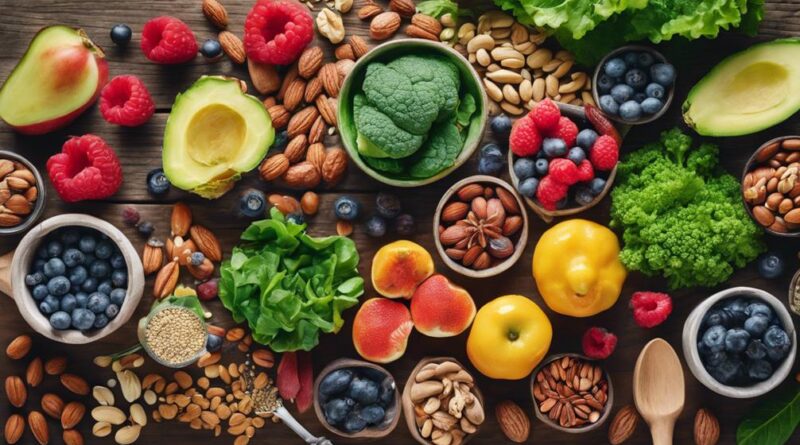7 Best Organic Foods Alleviating Allergy Symptoms
Organic foods can help alleviate allergy symptoms effectively. Include antioxidant-rich foods like apples, onions, berries, and citrus fruits in your diet. Vitamin C-packed fruits such as oranges, lemons, and grapefruits support your immune system. Omega-3 superfoods like chia seeds, flaxseeds, and walnuts have anti-inflammatory properties. Probiotic-rich options such as kombucha and kimchi balance gut health. Antioxidant-powerhouse veggies like broccoli sprouts and kale combat allergies naturally. High-quality organic products ensure safety and efficacy. Nutrient-dense seeds like chia, flax, and pumpkin support relief. Incorporate these foods for a natural way to help with allergies.
Quercetin-Rich Foods
If you're looking to tackle allergy symptoms naturally, incorporating quercetin-rich foods into your diet can be a beneficial strategy. Quercetin is a plant pigment that belongs to a group of compounds called flavonoids. It's known for its antioxidant properties and potential health benefits, including allergy relief.
Quercetin benefits individuals with allergies by acting as a mast cell stabilizer. Mast cells play a crucial role in allergic responses by releasing histamine and other inflammatory compounds. Quercetin helps prevent these cells from releasing histamine, thereby reducing allergic symptoms such as sneezing, itching, and nasal congestion.
Some quercetin-rich foods that you can easily include in your diet for allergy relief are apples, onions, berries, and citrus fruits. Apples, especially with their skin on, are a great source of quercetin. Onions, whether raw or cooked, are another excellent option. Berries like strawberries, blueberries, and raspberries can also contribute to your quercetin intake. Additionally, citrus fruits such as oranges and grapefruits provide not only quercetin but also vitamin C, which further supports your immune system.
Incorporating these quercetin-rich foods into your daily meals may help alleviate allergy symptoms naturally. Remember to maintain a balanced diet and consult a healthcare provider for personalized advice on managing your allergies.
Vitamin C-Packed Fruits
For individuals seeking to boost their intake of vitamin C to support their immune system, incorporating vitamin C-packed fruits into your diet is a simple and effective strategy. Vitamin C is a powerful antioxidant that helps combat free radicals in the body, reducing inflammation and supporting overall immune function. Citrus fruits like oranges, lemons, and grapefruits are excellent sources of vitamin C and can easily be incorporated into various dishes to enhance your daily intake.
One delicious way to enjoy vitamin C-packed fruits is by blending them into immune-boosting smoothies. You can combine fruits like strawberries, kiwis, and pineapples with a splash of orange juice for a refreshing and nutritious drink. These smoothies not only taste great but also provide a concentrated dose of vitamin C to help strengthen your body's defenses against allergens.
Another option is to create a vibrant citrus salad using a mix of vitamin C-rich fruits like oranges, grapefruits, and tangerines. Add a sprinkle of nuts or seeds for some extra crunch and drizzle with a honey-lime dressing for a flavorful twist. This citrus salad isn't only visually appealing but also a fantastic way to increase your vitamin C intake while enjoying a light and refreshing meal.
Incorporating vitamin C-packed fruits into your diet through options like immune-boosting smoothies and citrus salads can be a tasty and beneficial way to alleviate allergy symptoms and support your overall health.
Omega-3 Superfoods
Incorporating omega-3 superfoods into your diet can help alleviate allergy symptoms and support overall health. Omega-3 fatty acids are essential nutrients that have anti-inflammatory properties, which can be particularly beneficial for individuals dealing with allergies.
Here are three plant-based proteins rich in omega-3 sources that you can easily include in your diet:
- Chia Seeds: These tiny seeds are packed with omega-3 fatty acids, fiber, and antioxidants. Adding chia seeds to your yogurt, smoothies, or oatmeal can boost your omega-3 intake.
- Flaxseeds: Ground flaxseeds are a great plant-based source of omega-3 fatty acids. You can sprinkle them on top of salads, mix them into baked goods, or blend them into your morning smoothie.
- Walnuts: Walnuts aren't only delicious but also a good source of omega-3 fatty acids. Snack on a handful of walnuts, add them to your trail mix, or incorporate them into your salads for a crunchy omega-3 boost.
Probiotic-Rich Options
Boost your gut health and alleviate allergy symptoms by incorporating probiotic-rich options into your diet. These options can help balance the gut microbiota, strengthen the immune system, and reduce inflammation, all of which are beneficial for managing allergies.
Two excellent choices to consider are gut-friendly kombucha and immune-boosting kimchi.
Kombucha is a fermented tea that's rich in probiotics. These live microorganisms can help populate your gut with beneficial bacteria, promoting a healthy digestive system and overall well-being. Kombucha also contains antioxidants and anti-inflammatory compounds that can aid in reducing allergy symptoms. When selecting kombucha, opt for varieties with low sugar content to maximize its health benefits.
Kimchi is a traditional Korean dish made from fermented vegetables, such as cabbage and radishes, seasoned with garlic, ginger, and chili peppers. This spicy and tangy dish isn't only flavorful but also packed with probiotics that support gut health. The beneficial bacteria in kimchi can enhance the immune system's response and reduce the severity of allergic reactions. Incorporating kimchi into your meals can be a delicious way to introduce probiotics into your diet while potentially alleviating allergy symptoms.
Antioxidant-Powerhouse Veggies
Looking to enhance your diet with powerful antioxidants that can help combat allergy symptoms? Incorporating antioxidant-rich veggies into your meals can provide a natural and effective way to alleviate allergy symptoms. Here are three antioxidant-powerhouse veggies that you should consider adding to your diet:
- Broccoli Sprouts: Broccoli sprouts are a potent source of sulforaphane, a compound known for its strong antioxidant properties. Sulforaphane has been shown to have anti-inflammatory effects that can help reduce allergy symptoms. Adding broccoli sprouts to salads or sandwiches can be a tasty way to boost your antioxidant intake.
- Kale Salad: Kale is a nutrient-dense leafy green vegetable that's packed with antioxidants like vitamin C, beta carotene, and flavonoids. These antioxidants can help protect your cells from damage caused by free radicals and strengthen your immune system. Enjoying a kale salad as a side dish or main course can provide you with a generous dose of antioxidants.
Incorporating these antioxidant-rich veggies like broccoli sprouts and kale salad into your meals can't only enhance the flavor and variety of your diet but also support your body in combating allergy symptoms. Remember to consume a variety of colorful fruits and vegetables to ensure you're getting a wide range of antioxidants to promote overall health.
Herbal Allies for Allergies
For effective relief from allergy symptoms, explore the benefits of incorporating herbal allies into your diet and daily routine. Nettle tea and butterbur extract are two powerful herbal remedies known for their ability to alleviate allergy symptoms.
Nettle tea, made from the leaves of the stinging nettle plant, is a popular herbal remedy for allergies. Nettle contains natural antihistamines and anti-inflammatory properties that can help reduce sneezing, itching, and congestion associated with allergies. It can be consumed as a soothing tea to provide relief from seasonal allergies.
Butterbur extract is another herbal ally that has been shown to be effective in relieving allergy symptoms. Butterbur contains compounds that inhibit the production of leukotrienes, which are chemicals in the body that cause inflammation and allergic reactions. Studies have demonstrated that butterbur extract can help reduce symptoms such as nasal congestion, itchy eyes, and headaches in individuals with allergies.
When incorporating herbal allies like nettle tea and butterbur extract into your allergy relief routine, it's essential to choose high-quality, organic products to ensure their efficacy and safety. Consult with a healthcare provider or an herbalist to determine the right dosage and form of these herbal remedies for your specific allergy symptoms.
Nutrient-Dense Seeds

Consider incorporating nutrient-dense seeds into your diet to further enhance your allergy symptom relief regimen. Nutrient-dense seeds aren't only packed with essential vitamins and minerals but also contain beneficial compounds that can help alleviate allergy symptoms.
Here are some practical ways to incorporate these seeds into your daily routine:
- Chia Seeds: These tiny seeds are loaded with omega-3 fatty acids, which possess anti-inflammatory properties that can help reduce allergy symptoms. Add chia seeds to your morning oatmeal or yogurt, or include them in superfood smoothies for an extra nutritional boost.
- Flaxseeds: Rich in fiber and lignans, flaxseeds can aid in balancing hormones and reducing inflammation associated with allergies. Try incorporating ground flaxseeds into your baking recipes or sprinkle them over salads and soups.
- Pumpkin Seeds: Packed with magnesium and zinc, pumpkin seeds can support your immune system and help regulate inflammatory responses. Snack on pumpkin seeds throughout the day or include them in your seed cycling regimen to promote hormonal balance and reduce allergy symptoms.
Conclusion
Incorporating these 7 organic foods into your diet can help alleviate allergy symptoms by supporting your immune system and reducing inflammation.
Quercetin-rich foods, vitamin C-packed fruits, omega-3 superfoods, probiotic-rich options, antioxidant-powerhouse veggies, herbal allies, and nutrient-dense seeds all offer unique benefits for managing allergies.
Consider adding these foods to your meals to potentially reduce the severity of your allergy symptoms and improve your overall health.
